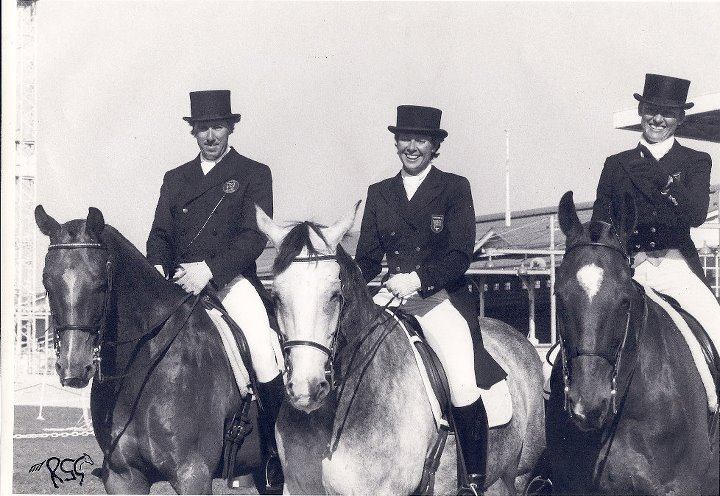
Susie Hoevenaars lives in Victoria, Australia. Her debut in the horse world… in fact never happened for one simple reason: she was born in the horse world. In Tasmania, an island off the southern coast of Australia. A dreamy and yet somewhat ‘peripheral’ place for someone who wants a career in the equestrian world, especially in dressage. But Susie…
Now a 5* judge with an excellent CV, Miss Hoevenaars tells her story
How and when did you meet horses? And where and why dressage?
«We lived in the country and my father had race horses and at the age of 6, I begged him to buy me a pony. Her name was “Jenny”, a black Shetland with a real personality, and a mind of her own. She taught me to ride.
After University I worked as a journalist in TV and I began riding my fathers ex -race horses. I Realised there was a lot more to training and became “hooked” on dressage. Riding, organising dressage events and becoming a national dressage judge».
Mrs Hoevenaars, how did you career develop?
«In 1995 Mariette Whitages judged in Australia and was instrumental in my becoming an international judge. I was riding at the time and she organized many opportunities to ” sit in “at European shows.
Later that year my federation recommended me to go the Candidate Judges Seminar in Hickstead run by Eric Lette, who also became a great mentor. I passed the course and became a 3*.
Then I was fortunate to be invited to judge many times in Europe over the following years. However it meant many months away from the business (breeding and training young horses with my husband Fred).
Australia is on the other side of the world and Europe is the center of dressage, so if I wanted to be good at judging it meant I had to travel. I could not just get on a train or drive over the border. So, there has meant many hours on a plane, and thousands of miles of travel . I could have gone to the moon and back several times over. Luckily I had Dutch family to stay with.
From then on I was given many judging opportunities and became a 4*, then a 5* judge. I am fortunate to have judged all Major Championships, WEG, the Europeans, World Breeding Championships, World Cup, all on several occasions ,culminating in the Tokyo Olympics.
Aachen has also been a wonderful show. Having been part of the Ground Jury there on many occasions, and this has been a real honour. I feel privileged to have been able to judge so many outstanding riders and horses from all over the world.
What a wonderful ride it has been and our sport has developed in leaps and bounds».

What is the relationship that should be running between judge, rider and other stakeholders?
«Communication is the” lynch pin ” of our sport. Dressage judging is an assessment sport – based on set criteria.
Judges now more than ever have to be professional, know their job, and be confident in their abilities. Most important for all judges, is to judge what they see.
Riders, trainers and judges – all 3 groups are responsible to make our sport better, more understandable and open. To make this happen we have to work together.
Riders want to understand what judges are looking for and understand their marks. After all, all riders want is an honest and transparent assessment of their ride.
Riders and trainers put a huge amount of time and effort into their training. For the rider, the top priority is to produce a good, correctly trained dressage horse.
The riders want to get it right. So do the judges.
But the judges task is not so simple. The top judges have to be able to judge 40 horses a day, with tests requiring up to 34 decisions. That is 1,360 clear and precise decisions over the day.
Judging is a special skill. It is not just about the technical and rules. It is about being able to see, absorb, know what is good, what is insufficient and everything in between».
Mrs. Hoevenaars, any suggestions to FEI regarding judges?
«I feel that the FEI could promote more opportunities for more in depth discussions with riders, trainers and judges, This would surely be a positive step forward, together with an increased focus on sports psychology as part of the training for up and coming international judges.
For optimum decision making, judges need not only to know the rules and technical requirements for each movement, but need to be to be able to focus, concentrate and deal with the “pressure cooker” situations of big Championships. Sport psychologists, can provide invaluable assistance in developing and enhancing these essential skills for judges.
With the confidence and experience gained through our very solid FEI judge education and training system, I know I can go out into the arena at the Olympics , in the knowledge that, with my fellow ground jury members we are all “on the same page” in our judgements, and have a great respect for each other.
At World and European championships and Olympic Games, it is the judges who “make the medals”.
The judge is responsible, as Eric Lette pointed out…”not only for the first horse in the class but the last as well.”
We have “the best seat in the house” and this must never abuse that trust.
The direction of our sport and the welfare of our friend , ”the horse” is paramount».



